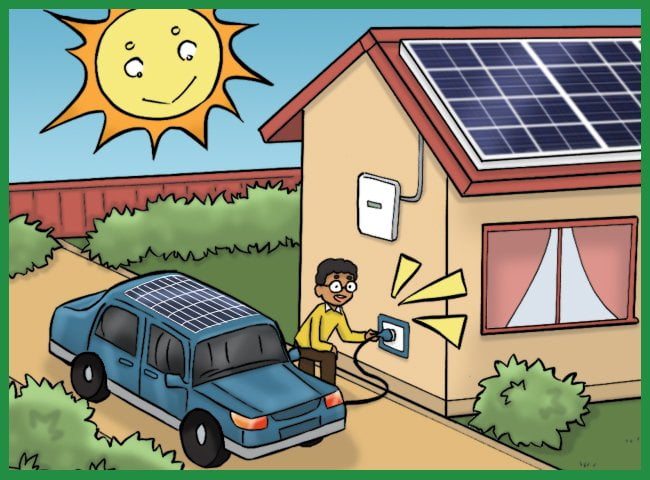Update 2020
Solar charge your electric car at home
Solar charging your electric car at home or work is totally feasible. This article explains how. Many people already do so. Small electric cars require only a 15 amp power point. The associated cable plugs into the car’s onboard charger.
Virtually all electric vehicles have a charging unit inbuilt. Consult the vendor about charging options.

Pic: SolarQuotes
If used for commuting 40-50 km a day, re-charging requires 2.5-5 kilowatt/hours. One kilowatt hour is often called ‘one unit’. During off-peak periods it may cost less.
Here’s a guide to how many kilometres you can drive before recharging.
| Type | Maximum charge (kW) | km/hour of charging |
| BMW i3 | 7.4 | 25 |
| Chevy Spark EV | 3.3 | 11 |
| Fiat 500e | 6.6 | 22 |
| Ford Focus Electric | 6.6 | 22 |
| Kia Soul EV | 6.6 | 22 |
| Mercedes B-Class Electric | 10 | 29 |
| Mitsubishi i-MieEV | 3.3 | 11 |
| Nissan Leaf | 3.3 – 6.6 | 11 – 22 |
| Smart Electric Drive | 3.3 | 11 |
| Tesla Models S & X | 10-20 | 29-58 |
Solar charge your electric car at home – how to do it
Solar charging your electric car at home or work is feasible. Many existing grid-connect solar systems have excess capacity. You capture solar during the day and sell the excess to the electricity supplier. Then charge the car at off-peak rates at night
Most Australian suppliers ask for about 25 cents per kilowatt-hour (off-peak). That is only slightly less than buying it back off-peak. It pays to shop around. All that’s needed is a quote from one supplier. Armed with that, most existing suppliers will reduce that for a two-year contract. If not, change suppliers. Unlike most products, grid electricity is standardised.
Daytime solar can be re-drawn at night to charge at off-peak rates. Many owners do this. Such charging permits charging overnight, with top-ups as required. Furthermore, it also extends battery life. All dislike ongoing deep discharging.
Using grid power costs only a dollar or two to commute. This is far less than for petrol-fuelled cars. Most use about 7 litres per 100 km. That typically costs (in 2020) about $9/day.
Economy electricity tariffs
Electric cars can be charged on economy electricity tariffs. Charging this way requires a dedicated charging point. This costs about A$1,750. A basic electric car charging unit costs about A$500. More advanced units cost up to A$2500. A licensed electrical contractor will advise re this.
If your charging rate exceeds fuse or circuit breaker rating, they must be upgraded. The cost is not high. Moreover, you save money by switching to such tariffs for charging overnight. You need, however, to install a dedicated charging point. So-using a standard electrical power point is illegal.
Another meter may be needed for the charging tariff. If so, that can be set up by your electrical contractor. Dealers may include an electrician’s advice in the car’s price.
You can reduce costs much further if you charge from a solar PV system. Furthermore, this also reduces carbon dioxide emission.
Charging at public outlets
Fast and super-fast chargers charge at up to 135 kW. They fully recharge an electric vehicle battery in 30 minutes. Owners use these only during long drives. They rely on routine charging at home and at work. Electric car vendors have charging services.
Fast charging facilities exist around Australia. They are even across the Nullabor Plain. See: Charge Stations in Australia (https://myelectriccar.com.au/charge-stations-in-australia). Or ChargePoint. Prices vary from state to state etc.
Electric Vehicle Battery Life
Battery technology is changing fast. Currently, most vehicle batteries’ life depends on their routine depth of discharge. Fully charge the batteries each night and they will live longer.
Most electric and hybrid car makers guarantee batteries for eight years. Nissan allows for 160,000 km, and capacity loss for 5 years or 96,500 km. Australians typically drive 14,000 kilometres a year. This necessitates battery replacing after about eight years. Outright failure, however, is improbable.
Summary
It is already totally feasible to charge cars from home and office solar. Moreover, it is done by many owners right now.
The Electric Vehicle Series
This is a part of a series of articles about the history and technology involved in electric vehicles.


